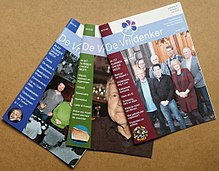Irreligion in the Netherlands
[2] Until World War II, the Netherlands had a small but influential Jewish minority for centuries.
17th century philosopher Baruch Spinoza was an early critic of religious authority in the country.
[3] Secularization, and the decline in religiosity, started around 1880 and first became noticeable after 1960 in the Protestant rural areas of Friesland and Groningen.
[6] With only 49.9% of the Dutch adhering to a religion as of 2015, the Netherlands is one of the least religious countries of Europe, after the Czech Republic and Estonia.
[citation needed] Research in 2003 shows that about 1.27 million people in the Netherlands express explicitly an affinity with secular humanism, which is about 9.4% of the total population.
[citation needed] In the 17th century, Baruch Spinoza and Hugo Grotius advanced humanist ideas.
The modern organized humanist movement began in the Netherlands in the mid-nineteenth century with the establishment of freethinkers association De Dageraad (The Dawn), influenced by writers like Multatuli, and later Anton Constandse.
[citation needed] With the establishment of the humanistic associations Humanitas in 1945 and the Humanistisch Verbond in 1946, Dutch humanists organized themselves after the Second World War to fight the still highly compartmentalized pillarized society which was dominated by separate Christians movements in the Netherlands.
[8] In December 2014, for the first time there were more atheists (25%) than theists (17%) in the Netherlands, with majorities of the population being agnostic (31%) or spiritual but not religious (27%).
